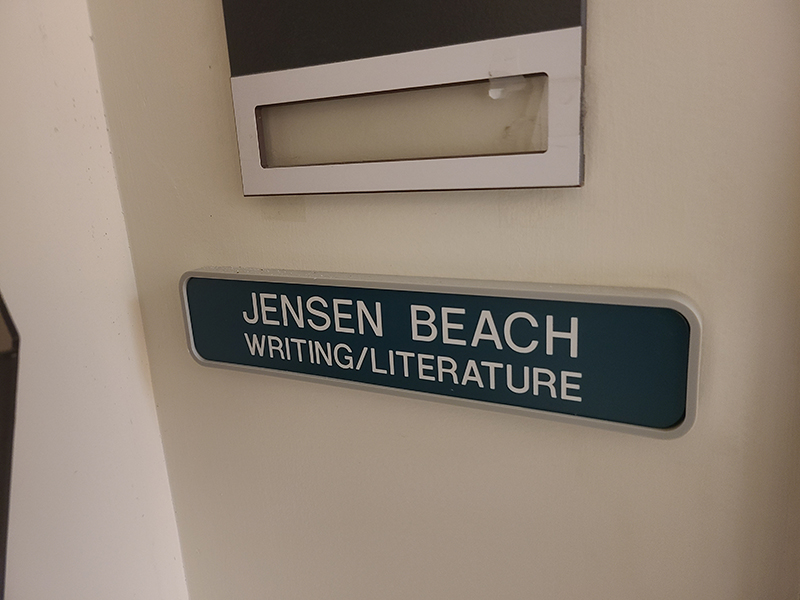A packed house at JSC’s Bentley 207 on Tuesday, Mar. 27, sat stunned and appalled, both during the documentary “Poster Girl” and afterwards, listening to the director and the star answer questions from the crowd.
A palpable tension enveloped the room as the documentary rolled. While most viewers had some forewarning as to the gut-wrenching content they would be confronted with, it would seem that no mere words of reviewers or clips of previews, can prepare an American audience for the raw emotional carnage US combat veteran Robynn Murray has allowed director Sarah Nesson to capture on film.
Nesson skillfully ties together footage of lectures Murray has delivered, photos and clips from her service in Iraq, scenes of her nearly futile attempts to receive meaningful treatment from VA hospitals, and her finally achieving a modicum of relief after connecting with other vets who suffer from Post-Traumatic Stress Disorder (PTSD).
Murray displays for Nesson’s camera numerous breakdowns and rages wrought by her experience in Iraq and the PTSD it caused.
Raised in a military family, Murray always had a desire to serve, saying in the film, “After Sept. 11 I just walked in and said, ‘I want to join the army. I want to go and help people’…I had no idea what I was really getting into.”
The high school cheerleader trusted her recruiter when, according to Murray, he told her she would be serving in a unit which would be performing humanitarian acts for the people of Iraq. Once in country she quickly discovered she had been misled. Her role as the machine gunner positioned in the turret atop an up-armored Humvee was not what she had envisioned in the recruiter’s office and quickly left her disillusioned.
The film presents one of Murray’s most harrowing experiences in combat. She found herself taking fire from an unseen enemy and later having to answer to a major who rode below within the armor of her vehicle. Murray told both him and the crowd that she couldn’t return fire without sighting a confirmed enemy combatant.
Standing before the crowd at JSC, her torment over her decision not to return fire that day was quite evident as she spoke. She emphatically stands behind her choice, saying she is eternally grateful she didn’t pull the trigger.
Murray and Nesson attempt to show in the film that Murray wasn’t receiving the treatment she felt she deserved from the VA, and after devolving into an emotional wreck, it was the camaraderie of fellow vets that allowed her to recover.
Murray joined others in the Combat Paper Project, a controversial group whose members shred their uniforms and manuals, recycling the material into new paper, which the vets use to make art inspired by their combat experiences. The controversial nature of the Burlington based group is perfectly highlighted in the film as Nesson’s camera zooms in on an American flag patch, attached to a uniform and being shredded to a pulp.
Nesson met Murray either while or prior to filming “Iraq Paper Scissors,” a film she shot after becoming involved with the Combat Paper Project. It is also important to note that “Poster Girl” does not provide any counterpoint, and that it would seem that for most of the footage, Murray is fully aware that the filming is for the purposes of the documentary.
The film, which is just under 40 minutes, was a nominee for the 2011 Academy Award for Best Documentary (Short Subject).
During the Q and A after the screening, Nesson described the shock she and Murray experienced when they had learned that a trip to the red carpet awaited them, and stressed that the pursuit of such accolades was never their intent. Nesson has said that her goal for the film “was to break through the cultural disconnect between veterans and civilians.”
The breaking through of this disconnect was evident at JSC. Though the presence of a VPR microphone and reporter may have contributed to the disconnect, the emotionally drained crowd sat silently after the screening, everyone scared to be the first to offer Murray a question. Once the questions began, they came fast and lasted for about an hour.
The most poignant moment occurred when a student stood and asked Murray what advice she might offer to someone considering enlisting.
Murray stood stunned for a brief moment before cutting through all pretense, telling the student that she would be more than happy to dissuade her after the presentation and to provide her email address if further discouragement were necessary.
Nesson then took the microphone and offered a more academic response, saying that she would recommend bringing a lawyer into the recruiter’s office. She said that if you wouldn’t even think of buying a house without an attorney, why would you sign a contract that might cost you your life without one.



